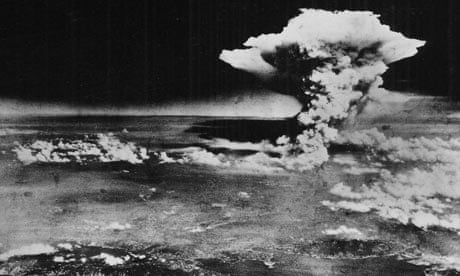The mayor of Hiroshima today backed Barack Obama's call for the abolition of nuclear weapons when he spoke at a ceremony to mark the 64th anniversary of the atomic bombing of the Japanese city.
Tadatoshi Akiba said he was speaking for the global "Obamajority" in calling for the elimination of all nuclear weapons by 2020.
"We have the power. We have the responsibility. And we are the Obamajority," he said, also invoking the US president's "Yes, we can" campaign soundbite.
In a speech in Prague earlier this year, Obama said the US, as the only country to have used nuclear weapons, had a "moral responsibility" to bring about their abolition.
About 50,000 people, including survivors and foreign dignitaries, gathered in Hiroshima's peace memorial park to remember the moment, at 8.15am on 6 August 1945, when a B-29 bomber dropped "Little Boy" on the city, reducing it to rubble.
The blast killed 80,000 people instantly, with the death toll rising to an estimated 140,000 by the end of the year.
The Japanese prime minister, Taro Aso, repeated his commitment to Japan's non-nuclear principles – to never build, or possess, nuclear weapons, or allow them on the country's soil.
The UN secretary general, Ban Ki-moon, said complete nuclear disarmament should no longer be dismissed as a pacifist fantasy.
"I call on humanity to support this sensible and achievable goal," he said. "Let us each do our part in this common journey, and thereby ensure that there will be no more victims such as those we honour today."
According to the government, there were more than 235,000 A-bomb survivors in Japan in March this year – about 8,000 fewer than last year – with an average age of 75.
On 9 August 1945, the US dropped an atomic bomb on Nagasaki, killing about 80,000 people. Japan surrendered less than a week later.
More than six decades on, the bombings continue to divide opinion among Japanese and US citizens.
In a poll published earlier this week, nearly two-thirds of Americans said the US had been right to bomb Hiroshima and Nagasaki.
Only 22% of respondents to a poll by Quinnipiac University believed the then US president, Harry Truman, had been wrong to order the cities' destruction.

Comments (…)
Sign in or create your Guardian account to join the discussion